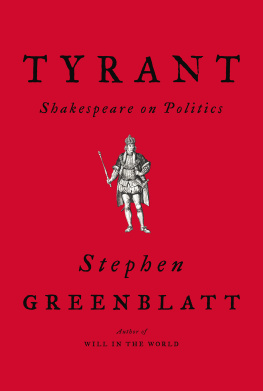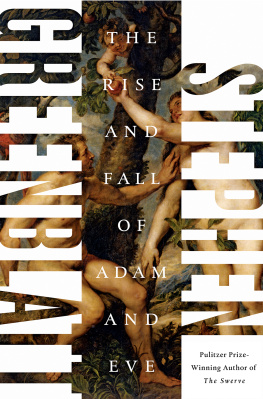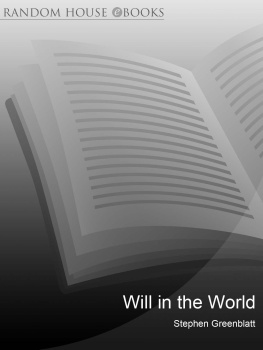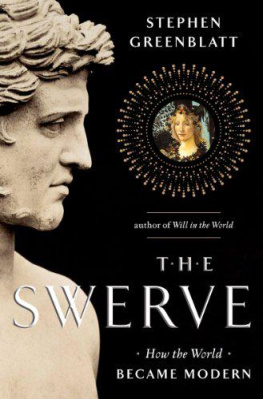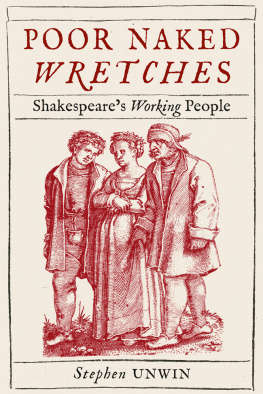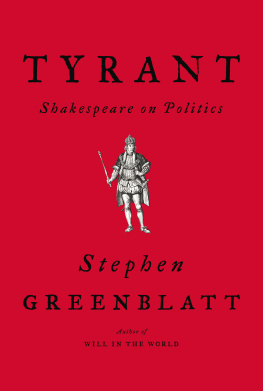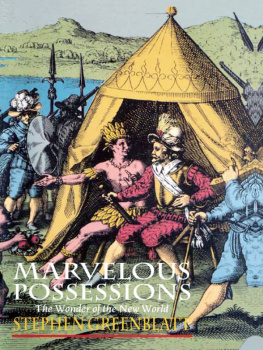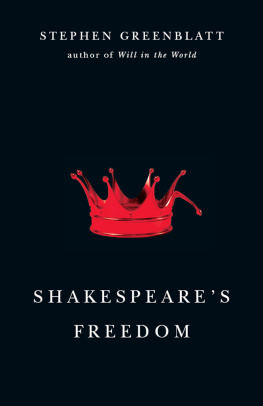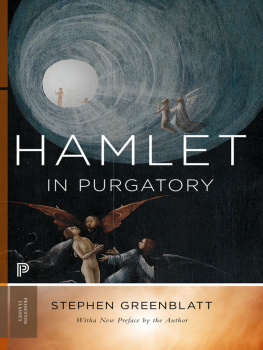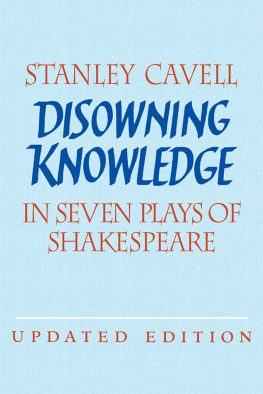
E DITED BY S TEPHEN G REENBLATT
Shakespeares Montaigne: The Florio Translation of the Essays (with Peter G. Platt)
Religio Medici and Urne-Buriall (with Ramie Targoff)
Cultural Mobility: A Manifesto
The Norton Anthology of English Literature (general editor)
The Norton Shakespeare (general editor)
New World Encounters
Redrawing the Boundaries: The Transformation
of English and American Literary Studies (with Giles Gunn)
Representing the English Renaissance
Allegory and Representation
A LSO BY S TEPHEN G REENBLATT
The Rise and Fall of Adam and Eve
The Swerve: How the World Became Modern
Shakespeares Freedom
Will in the World: How Shakespeare Became Shakespeare
Hamlet in Purgatory
Practicing New Historicism (with Catherine Gallagher)
Marvelous Possessions: The Wonder of the New World
Learning to Curse: Essays in Early Modern Culture
Shakespearean Negotiations: The Circulation
of Social Energy in Renaissance England
Renaissance Self - Fashioning : From More to Shakespeare
Sir Walter Ralegh: The Renaissance Man and His Roles
Three Modern Satirists: Waugh, Orwell, and Huxley
TYRANT
S HAKESPEARE ON P OLITICS
S TEPHEN
G REENBLATT

Copyright 2018 by Stephen Greenblatt
All rights reserved
First Edition
For information about permission to reproduce selections from this book, write to Permissions, W. W. Norton & Company, Inc., 500 Fifth Avenue, New York, NY 10110
For information about special discounts for bulk purchases, please contact W. W. Norton Special Sales at specialsales@wwnorton.com or 800-233-4830
Book design by Marysarah Quinn
Production manager: Anna Oler
JACKET DESIGN BY DARREN HAGGAR
JACKET ART: HERITAGE-IMAGES / THE PRINT COLLECTOR / AKG-IMAGES
ISBN 978-0-393-63575-1
ISBN 978-0-393-63576-8 (e-book)
W. W. Norton & Company, Inc., 500 Fifth Avenue, New York, N.Y. 10110
www.wwnorton.com
W. W. Norton & Company Ltd., 15 Carlisle Street, London W1D 3BS
To Joseph Koerner and Luke Menand
C ONTENTS
TYRANT
F ROM THE EARLY 1590 S, at the beginning of his career, all the way through to its end, Shakespeare grappled again and again with a deeply unsettling question: how is it possible for a whole country to fall into the hands of a tyrant?
A king rules over willing subjects, wrote the influential sixteenth-century Scottish scholar George Buchanan, a tyrant over unwilling. The institutions of a free society are designed to ward off those who would govern, as Buchanan put it, not for their country but for themselves, who take account not of the public interest but of their own pleasure. Under what circumstances, Shakespeare asked himself, do such cherished institutions, seemingly deep-rooted and impregnable, suddenly prove fragile? Why do large numbers of people knowingly accept being lied to? How does a figure like Richard III or Macbeth ascend to the throne?
Such a disaster, Shakespeare suggested, could not happen without widespread complicity. His plays probe the psychological mechanisms that lead a nation to abandon its ideals and even its self-interest. Why would anyone, he asked himself, be drawn to a leader manifestly unsuited to govern, someone dangerously impulsive or viciously conniving or indifferent to the truth? Why, in some circumstances, does evidence of mendacity, crudeness, or cruelty serve not as a fatal disadvantage but as an allure, attracting ardent followers? Why do otherwise proud and self-respecting people submit to the sheer effrontery of the tyrant, his sense that he can get away with saying and doing anything he likes, his spectacular indecency?
Shakespeare repeatedly depicted the tragic cost of this submissionthe moral corruption, the massive waste of treasure, the loss of lifeand the desperate, painful, heroic measures required to return a damaged nation to some modicum of health. Is there, the plays ask, any way to stop the slide toward lawless and arbitrary rule before it is too late, any effective means to prevent the civil catastrophe that tyranny invariably provokes?
The playwright was not accusing Englands current ruler, Elizabeth I, of being a tyrant. Quite apart from whatever Shakespeare privately thought, it would have been suicidal to float such a suggestion onstage. Dating back to 1534, during the reign of the queens father, Henry VIII, legal statutes made it treason to refer to the ruler as a tyrant. The penalty for such a crime was death.
There was no freedom of expression in Shakespeares England, on the stage or anywhere else. The 1597 performances of an allegedly seditious play called The Isle of Dogs led Informants attended the theater, eager to claim a reward for denouncing to the authorities anything that could be construed as subversive. Attempts to reflect critically on contemporary events or on leading figures were particularly risky.
As with modern totalitarian regimes, people developed techniques for speaking in code, addressing at one or more removes what most mattered to them. But it was not only caution that motivated Shakespeares penchant for displacement. He seems to have grasped that he thought more clearly about the issues that preoccupied his world when he confronted them not directly but from an oblique angle. His plays suggest that he could best acknowledge truthto possess it fully and not perish of itthrough the artifice of fiction or through historical distance. Hence the fascination he found in the legendary Roman leader Caius Martius Coriolanus or in the historical Julius Caesar; hence the appeal of such figures from the English and Scottish chronicles as York, Jack Cade, Lear, and, above all, the quintessential tyrants Richard III and Macbeth. And hence, too, the lure of entirely imaginary figures: the sadistic emperor Saturninus in Titus Andronicus ; the corrupt deputy Angelo in Measure for Measure ; the paranoid King Leontes in The Winters Tale.
Shakespeares popular success suggests that many of his contemporaries felt the same thing. Liberated from the surrounding circumstances and liberated, too, from the endlessly repeated clichs about patriotism and obedience, his writing could be ruthlessly honest. The playwright remained very much part of his place and time, but he was not their mere creature. Things that had been maddeningly unclear came into sharp focus, and he did not need to remain silent about what he perceived.
Shakespeare understood, as well, something that in our own time is revealed when a major eventthe fall of the Soviet Union, the collapse of the housing market, a startling election resultmanages to throw a garish light on an unnerving fact: even those at the center of the innermost circles of power very often have no idea what is about to happen. Notwithstanding their desks piled high with calculations and estimates, their costly network of spies, their armies of well-paid experts, they remain almost completely in the dark. Looking on from the margins, you dream that if you could only get close enough to this or that key figure, you would have access to the actual state of affairs and know what steps you need to take to protect yourself or your country. But the dream is a delusion.
At the beginning of one of his history plays, Shakespeare introduces the figure of Rumor, in a costume painted full of tongues, whose task is ceaselessly to circulate stories blown by surmises, jealousies, conjectures ( Henry IV Induction 16). Its effects are painfully apparent in disastrously misinterpreted signals, fraudulent comforts, false alarms, sudden lurches from wild hope to suicidal despair. And the figures most deceived are not the gross multitude but, rather, the privileged and powerful.
Next page
